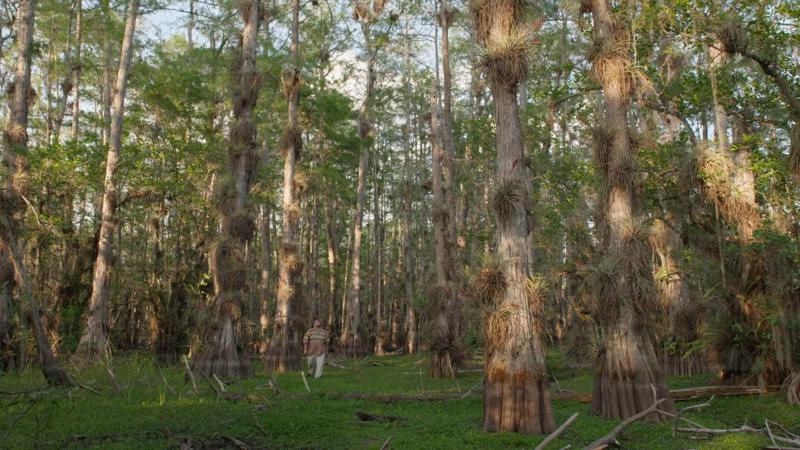River of Grass Is a Lyrical Walk Through the Everglades with the Ghost of Marjory Stoneman Douglas

There are a lot of ways to make a documentary, when the goal is to draw attention to the topic of your choosing. You can choose to focus on education, on instilling the facts surrounding a topic into your audience, but Sasha Wortzel’s River of Grass certainly isn’t that. Documentaries with education as the primary goal don’t fall silent so frequently and comfortably as this one does, making for an experience that can be more like a long, laconic nature cruise with a very comfortable spouse, occasionally broken up by discussion, rather than a classroom where one is actively absorbing a lesson from an all-knowing instructor. River of Grass is perhaps best described as lightly informative in its tribute to Florida’s vast Everglades and the influence of pioneering ecologist Marjory Stoneman Douglas, more influenced instead by a desire to stir the viewer emotionally and soulfully, to invite them into the bewitching, intoxicatingly thick air of a place where life teems in every direction you could think to look.
This River of Grass–not to be confused with the 1994 Kelly Reichardt drama of the same name–lifts its title in dedication from Marjory Stoneman Douglas’ influential 1947 tome, a piece of lyrical nonfiction that helped to redefine public perception of Florida’s Everglades at a time when the marshlands were often viewed as a fetid, pestilent swamp that was more of an obstacle to Florida’s development than anything. Inspired since childhood by the work Douglas began, Wortzel has turned her project into one part wistful reminiscence of a childhood on the edge of a vanishing wilderness, one part biography of Douglas, and one part call for harmony with the natural world. At times lacking direction, content to essentially flow freely like the watery pathways of the place it captures, a Gordian knot of greenery and biological life, the film nevertheless has a certain mythic power to it by virtue of its stirring cinematography and the relevance of Douglas’ words, which frequently accompany all we see. Wortzel’s reverence here can border on fawning, with Douglas’ words from River of Grass or her other writings scrolling across the screen like excerpts from a holy text. Of course, to many of the people in the film, that might be an apt descriptor for Douglas’ work.
At first, one expects that the film will revolve more tightly around the arrival of Hurricane Ian, which in Sept. of 2022 caused severe damage throughout southern and central Florida, including to the Everglades. The images of destruction, however, are essentially welcomed into the fold by Wortzel as one of the many natural processes that make up the continuous self-shaping and reshaping of the area that man’s presence has effectively interrupted. Once upon a time, a storm like Ian would have played a key role in refreshing the biodiversity of the area, but this is now less possible thanks to human intervention and control of the waterways, which are not allowed to flow as they once did. Perhaps the hurricane’s arrival did serve as the starting point for the project, however, as Wortzel notes that “10 days after the storm, Marjorie came to me in a dream.” One imagines a Hamlet-like scene, with Douglas–whose name now sadly redirects all too often to the Parkland High School shooting rather than to ecological work–telling her admirer to safeguard the sacred waters rather than to avenge her. Douglas, a rare character, needed no help in this regard–she was an astounding 108 years old when she passed away in 1998, a person who somehow saw both the dawn of the 20th century and the rise of home internet access. Truly a staggering lifetime.
There are moments of River of Grass that are informative in the way you’d expect from Discovery Channel-esque nature documentaries–it’s fascinating, for instance, to learn about the ways that alligators, a “keystone species” of the Everglades, excavate large water holes in the dry season, which serve to nurture both themselves and a host of other animal species simultaneously. More of the footage, however, is framed loosely around the human beings who have long existed in the area’s shadow, such as indigenous Americans on a “prayer walk” through the Everglades, who are frequently impeded by the machinations and ownership claims of private corporations or government entities that seek to tightly mold and control a region long held as sacred and inviolable by the people who were there first. One of these natives speaks of the water as a personified being, saying the following: “The water is sad, because it’s being made out as if she’s the enemy. And she’s just a victim, being victimized by her relations around her–that’s us.” It’s cross-cut with context-adding footage about how the growth of large population centers such as Miami slowly ate away at the Everglades territory.
- Curated Home Page Articles By Test Admin October 21, 2025 | 3:10pm
-

- Curated Home Page Articles By Test Admin October 21, 2025 | 2:57pm
- Urls By Test Admin October 21, 2025 | 2:57pm
- Curated Home Page Articles By Test Admin October 21, 2025 | 2:55pm
-

-

-

-

-

-

-

-

-

-

-

-

-

-

-

-

-

-

-

-

-

-

-

-

-

-

-

-

-

-

-

-

-

-

-




































